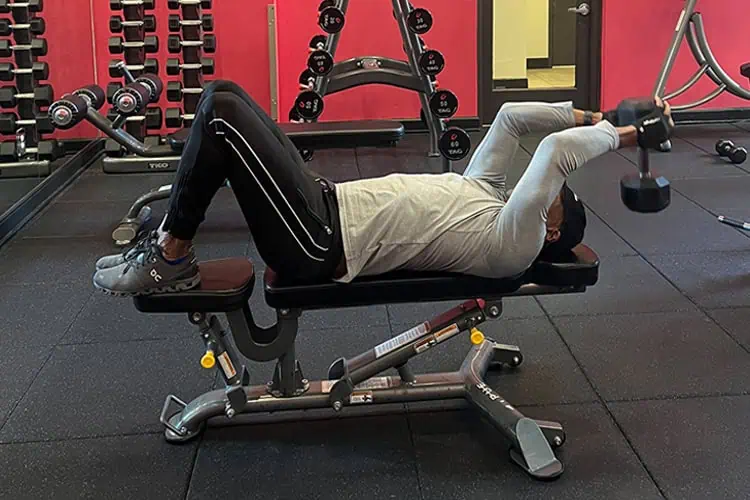
The dumbbell pullover is a versatile and basic train that has stood the take a look at of time. Widely carried out in bodybuilding and power coaching routines, this train successfully targets each the chest and back muscle groups, making it a distinctive addition to any workout program. In this complete information, we’ll discover the advantages, correct techniques, variations, and customary errors related to the dumbbell pullover train.
What is The Dumbbell Pullover Exercise?
The dumbbell pullover is a strength-training exercise carried out with a single dumbbell, sometimes mendacity throughout a bench. It is understood for its twin potential to interact each the pectoral muscle groups (chest) and the latissimus dorsi (back) muscle groups. Depending on the shape and vary of movement used, the emphasis can shift between the chest and back, making it a versatile train for higher physique development.
Historically, the dumbbell pullover was popularized within the golden period of bodybuilding, with legends like Arnold Schwarzenegger steadily together with it of their routines. It stays a staple train as a result of its compound nature, partaking a number of muscle teams and selling general higher physique power.
Benefits of the Dumbbell Pullover Exercise
1. Dual Muscle Engagement
One of the distinctive advantages of the dumbbell pullover is its potential to focus on each the chest and back muscle groups concurrently. When executed with a give attention to the chest, it really works the pectoralis main, enhancing chest power and measurement. Conversely, when the main focus is on the back, it successfully engages the latissimus dorsi, contributing to a broader, more outlined back.
2. Improved Flexibility
The dumbbell pullover additionally promotes thoracic backbone and shoulder flexibility. The stretching movement on the high of the train improves the mobility of the shoulder joint and enhances the pliability of the chest and lat muscle groups. This might be notably helpful for people who spend long hours sitting or have poor posture, because it counteracts the consequences of a rounded higher back and tight shoulders.
3. Enhanced Core Stability
While the first focus is on the higher physique, the dumbbell pullover additionally engages the core muscle groups. To keep correct kind and forestall hyperextension of the decrease back, the core have to be activated all through the motion. This helps improve core stability and power, contributing to raised posture and general purposeful fitness.
4. Versatility and Accessibility
The dumbbell pullover might be carried out with minimal gear—a single dumbbell and a flat bench—making it accessible for home workouts or health club routines. It will also be modified in numerous methods to focus on particular muscle teams more intensively or to adapt to totally different fitness ranges.
Proper Technique For The Dumbbell Pullover Exercise
Step-by-Step Guide
To carry out the dumbbell pullover appropriately, observe these steps:
- Starting Position:
- Lie flat on a bench along with your toes firmly planted on the ground.
- Hold a dumbbell with each arms, palms pressed in opposition to the underside of the higher plate.
- Extend your arms absolutely above your chest, retaining a slight bend within the elbows to keep away from joint pressure.
- Execution:
- Slowly decrease the dumbbell in an arc over your head, sustaining the slight bend in your elbows.
- Lower the burden till you’re feeling a stretch in your chest and lats, making certain your back stays flat in opposition to the bench.
- Engage your core to stop your decrease back from arching excessively.
- Pause briefly on the backside of the motion, feeling the stretch and engagement in your goal muscle groups.
- Return to Starting Position:
- Exhale as you convey the dumbbell back to the beginning place, utilizing your chest and back muscle groups to control the motion.
- Ensure the motion is gradual and managed all through your complete vary of movement.
Tips for Proper Form
- Keep a Slight Bend in Your Elbows: Avoid locking out your elbows to cut back the risk of joint pressure and to take care of muscle stress all through the train.
- Focus on Controlled Movements: Use a gradual and managed tempo, particularly when decreasing the dumbbell, to maximise muscle engagement and scale back the risk of damage.
- Engage Your Core: Keep your core tight all through the motion to stop your decrease back from arching and to take care of correct kind.
Variations of the Dumbbell Pullover Exercise
1. Decline Dumbbell Pullover
The decline dumbbell pullover is carried out on a decline bench, which locations extra emphasis on the decrease chest and lats. This variation will increase the vary of movement, offering a more important stretch and probably enhancing muscle activation.
How to Perform:
- Set a decline bench at a reasonable angle.
- Follow the identical steps as the usual dumbbell pullover, specializing in sustaining control and interesting your core.
2. Single-Arm Dumbbell Pullover Exercise
The single-arm dumbbell pullover is an glorious variation for concentrating on muscle imbalances and growing unilateral power. It additionally challenges your core stability more than the normal model, as you have to work more durable to stabilize your physique during the train.
How to Perform:
- Lie flat on a bench, holding a dumbbell in a single hand.
- Extend the arm holding the dumbbell above your chest whereas the opposite arm stays by your facet for assist.
- Perform the pullover motion with the one arm, making certain correct kind and control.
3. Dumbbell Pullover on a Stability Ball
Performing the dumbbell pullover on a stability ball provides an aspect of instability, partaking more core muscle groups and enhancing stability and coordination.
How to Perform:
- Position your self on a stability ball along with your higher back and shoulders resting on the ball and your toes planted firmly on the ground.
- Hold a dumbbell with each arms and lengthen your arms above your chest.
- Perform the pullover motion whereas sustaining stability on the steadiness ball.
Common Mistakes to Avoid With Dumbbell Pullover Exercise
1. Overarching the Lower Back
One of the commonest errors during the dumbbell pullover is permitting the decrease back to arch excessively. This can place undue stress on the decrease back and scale back the effectiveness of the train. To stop this, have interaction your core muscle groups and hold your back flat in opposition to the bench all through the motion.
2. Using Too Much Weight
While it could be tempting to make use of a heavy dumbbell to construct power, utilizing an excessive amount of weight can compromise your kind and increase the risk of damage. Start with a lighter weight and give attention to mastering the correct method earlier than steadily growing the burden.
3. Rushing Through the Movement
The dumbbell pullover must be carried out slowly and intentionally. Rushing by way of the motion can scale back muscle engagement and increase the probability of damage. Focus on a managed tempo, particularly when decreasing the dumbbell.
4. Locking the Elbows
Locking the elbows during the train can shift the emphasis away from the goal muscle groups and increase the risk of joint pressure. Maintain a slight bend in your elbows all through the motion to maintain stress on the chest and back muscle groups.
How to Incorporate Dumbbell Pullover Exercise into Your Routine
For Chest-Focused Workouts
To emphasize the chest, incorporate the dumbbell pullover into your higher physique or chest day routine. Perform the train after compound actions just like the bench press or push-ups to isolate the chest muscle groups additional.
Suggested Routine:
- Bench Press – 3 units of 8-12 reps
- Dumbbell Flyes – 3 units of 10-15 reps
- Dumbbell Pullover – 3 units of 12-15 reps
For Back-Focused Workouts
For back development, embody the dumbbell pullover in your back day routine. Combine it with different back workouts like pull-ups, rows, or lat pulldowns for a full upper body workout.
Suggested Routine:
- Pull-Ups – 3 units to failure
- Bent-Over Rows – 3 units of 8-12 reps
- Dumbbell Pullover – 3 units of 12-15 reps
For Full-Body Workouts
The dumbbell pullover will also be integrated into full-body exercises, notably when specializing in compound actions that have interaction a number of muscle teams. Pair it with workouts like squats, deadlifts, and shoulder presses for a complete exercise.
Suggested Routine:
- Squats – 3 units of 10-15 reps
- Dumbbell Pullover – 3 units of 12-15 reps
- Shoulder Press – 3 units of 8-12 reps
Safety Tips and Precautions Dumbbell Pullover Exercise
- Warm Up Properly: Always heat up earlier than beginning your exercise to stop damage and improve efficiency. Include dynamic stretches and mobility workouts that concentrate on the shoulders, chest, and back.
- Choose the Right Weight: Start with a gentle weight and steadily increase it as you construct power and confidence in your kind.
- Listen to Your Body: If you expertise ache or discomfort in your shoulders or back, stop the train instantly and reassess your kind. Consult a fitness skilled if needed.
- Maintain Proper Form: Focus on correct kind and managed actions all through the train. Avoid utilizing momentum or compensating with different muscle teams.
The dumbbell pullover is a versatile and efficient train for building higher physique power, enhancing flexibility, and selling core stability. By concentrating on each the chest and back muscle groups, it supplies a distinctive alternative to develop a balanced and well-defined higher physique. Whether you might be a newbie or an skilled lifter, incorporating the dumbbell pullover into your exercise routine can help you obtain your fitness objectives. Remember to prioritize correct kind, begin with a manageable weight, and take heed to your physique to maximise the advantages of this basic train.

